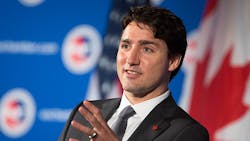Canada-US Trade Deal Possible If NAFTA Fails, Trudeau Says
Canadian Prime Minister Justin Trudeau said he would consider one-on-one talks with the U.S. on trade, if negotiations to update the North American Free Trade Agreement fail.
“We will always look at different opportunities,” Trudeau said Thursday in response to a question about a two-way U.S. trade deal at the Fortune Global Forum in China. “We’re ready for anything, when things come forward. The new administration has shown a willingness to disrupt the patterns of past behavior and look for new models, and we’re willing to entertain next steps forward.”
The prime minister, who was in the southern Chinese city of Guangzhou to wrap up a five-day visit, said the 23-year-old NAFTA “needs to be updated” and warned that canceling the pact would harm Canadians. His comments followed the unexpected breakdown in Canada’s efforts to launch free-trade talks with China, with officials saying the two sides would continue discussions.
While Trudeau reaffirmed his desire to save NAFTA, which underpins $1.2 trillion of trade, his comments will likely fuel speculation that Canada is preparing to move ahead without Mexico. The remarks come just weeks after other members of the Trans-Pacific Partnership criticized Canada for upending efforts to resurrect the trade pact without the U.S.
‘Very Confident’
The Canadian government has repeatedly said it was committed to working with Mexico to renew NAFTA, but officials have sometimes signaled a willingness to consider a two-way pact of the kind U.S. President Donald Trump prefers. Trump has threatened to scrap NAFTA, if the other two signatories don’t accept proposals that the administration argues will reduce U.S. trade deficits.
“We’re still very confident in the kinds of support and response that we’ve gotten from friends, partners, colleagues in the U.S. who recognize that trade is a powerful driver of growth and benefit to citizens,” Trudeau said Thursday.
Canada and the U.S. had a bilateral trade deal that was superseded and suspended by NAFTA. Canada’s chief NAFTA negotiator told lawmakers this week that the old agreement would kick in again if Nafta failed, although it would have to be re-implemented.
China Talks
Starting talks with China could strengthen Trudeau’s hand in NAFTA negotiations, demonstrating that the U.S.’s second-largest trading partner has other options. But a personal visit to Beijing -- the second in as many years for Trudeau -- wasn’t enough to overcome Chinese concerns about the “progressive” trade provisions Canada insists must be part of any deal.
Another issue under discussion was the role of state-owned enterprises, Trudeau told reporters later Thursday. In 2012, former Prime Minister Stephen Harper imposed restrictions on the acquisition of oil-sands companies by SOEs after Cnooc Ltd. bought Nexen Inc., of Calgary. Trudeau said the Chinese government’s involvement in strategic industries was “characteristic of their approach.”
“That has particular implications when you have state-owned enterprises competing in the same sphere as private enterprises,” Trudeau said. “Any discussion on trade as we move forward needs to reflect on the challenges, the opportunities, the advantages and the inconvenience when two systems that are different are trying to collaborate, so we can create benefits for both groups of citizens.”
Next Steps
As of midday Thursday, it appeared that Trudeau would be leaving China without a breakthrough. Trade Minister Francois-Philippe Champagne spent two extra days in Beijing to pursue talks about the eventual framework of the agreement with Chinese Commerce Minister Zhong Shan and other officials, a Canadian government spokesman said.
Champagne was expected to head back to Ottawa with Trudeau on Thursday evening, as the Liberal government regroups on its next trade move.
“We believe a free trade deal will benefit both Canada and China,” Gao Feng, a spokesman for the Chinese Commerce Ministry, told reporters Thursday in Beijing. “China will keep working with the Canadian side in practical and open attitude to promote the China-Canada free-trade zone, creating conditions to begin the trade talks as early as possible.”
By Chris Fournier
About the Author
Bloomberg
Licensed content from Bloomberg, copyright 2016.
